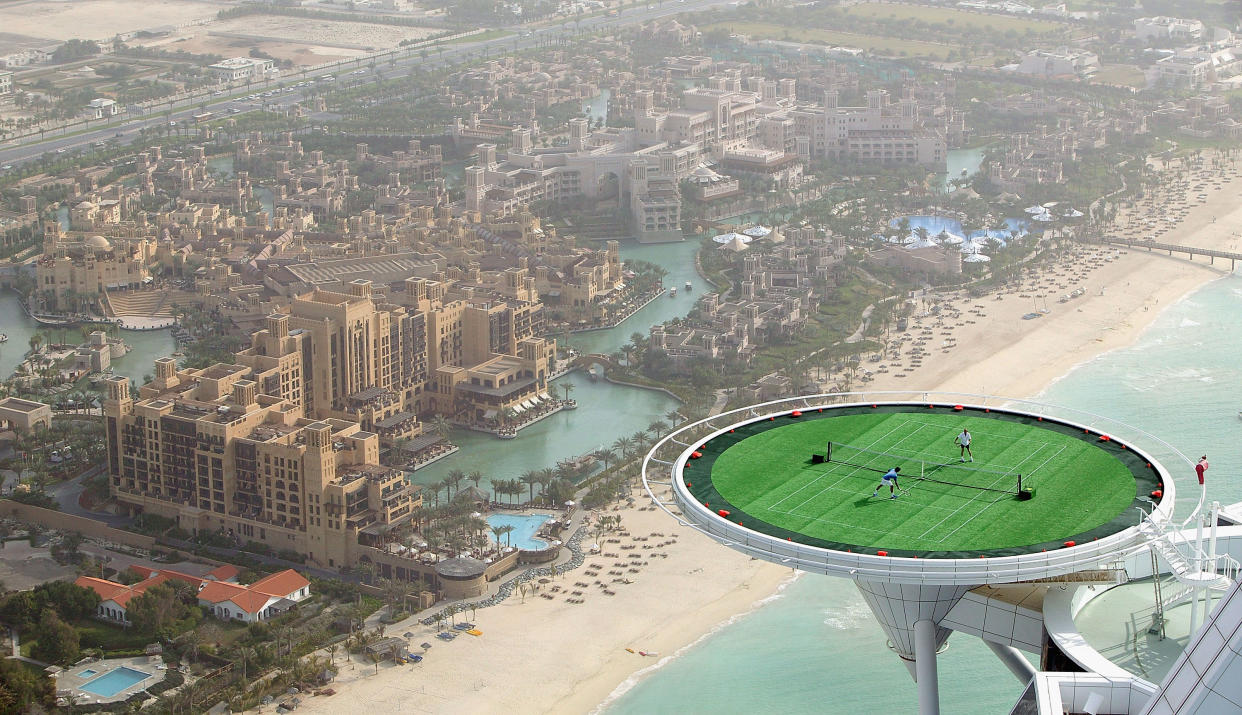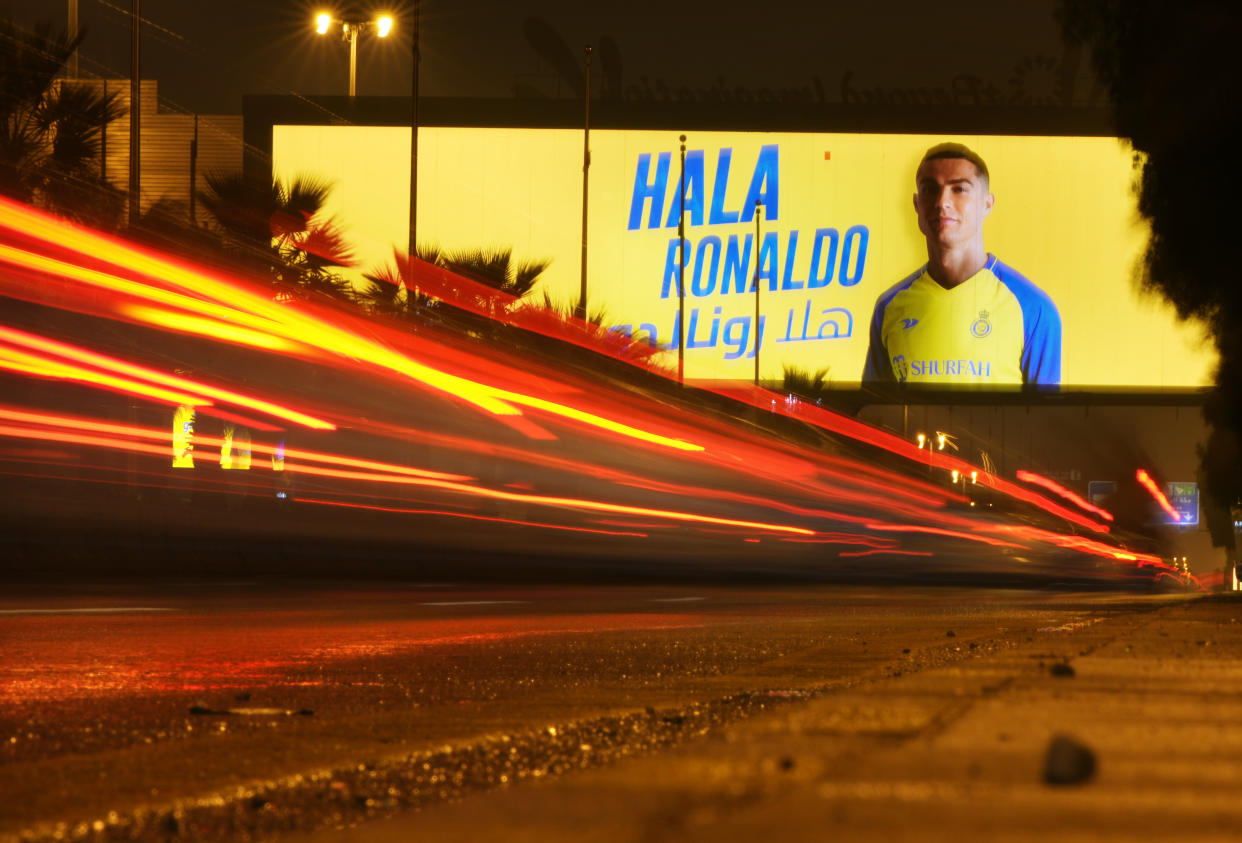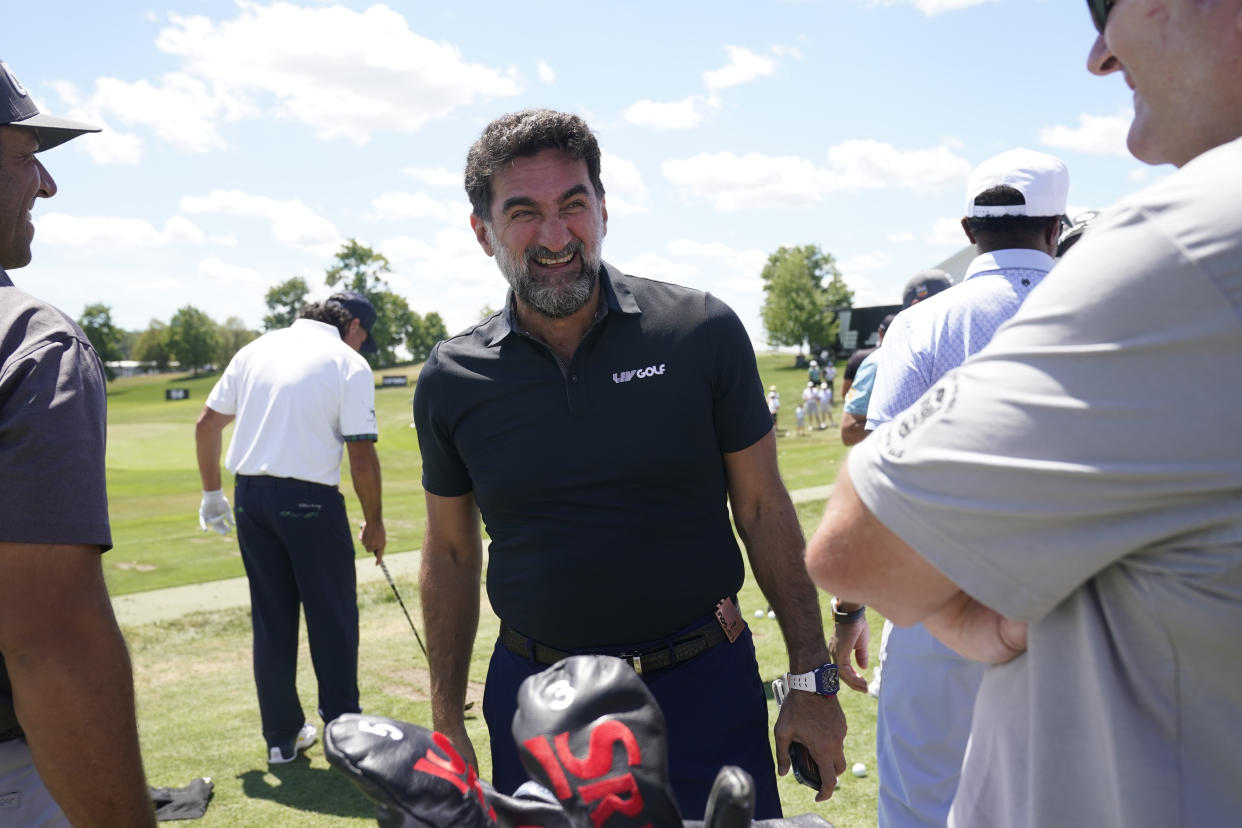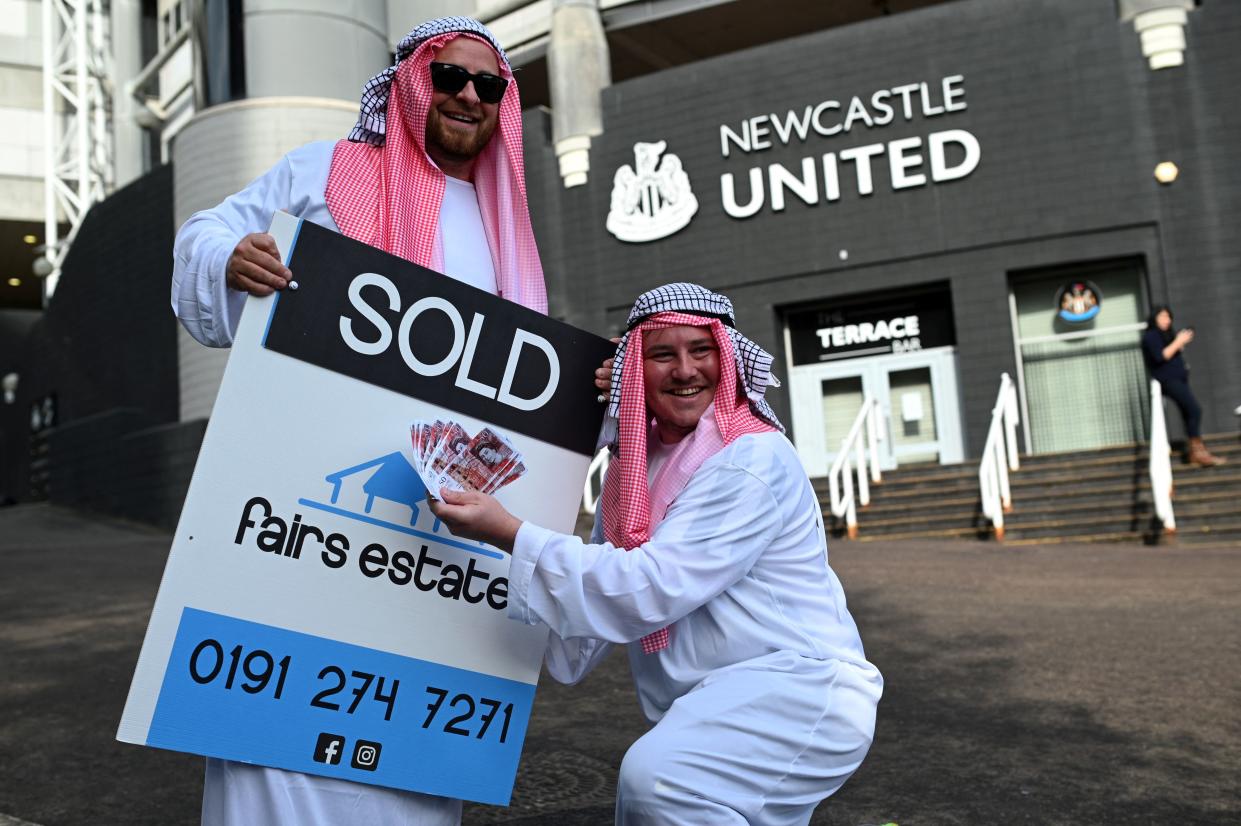It's not about sportswashing
Only a few minutes after he began laying out his vision for how to grow Manchester City into a global brand, marketing executive David Pullan noticed two strangers in the back of the room eavesdropping on his job interview.
Those were Sheikh Mansour’s trusted advisers, Pullan later learned. The second-most famous club in Manchester, the club that hadn’t won anything of significance in 32 years, was about to be sold to a member of the royal family of Abu Dhabi.
For Pullan, taking over as City’s chief marketing officer in late 2008 was akin to joining Amazon when it sold only books or Starbucks before it expanded outside Seattle. A lot of work needed to be done to prepare City to compete with the best clubs in England, let alone Europe.
It wasn’t just that City’s previous owner had his assets frozen and left behind a starless roster and millions of dollars in debt. The club had no team-run website or social media accounts. The marketing department that Pullan inherited consisted of only three people. A Manchester pop music radio station and a British travel agency were City’s biggest sponsors.
In his introductory letter to fans after the sale of the club, Mansour vowed to transform City from punch line to powerhouse, to build “a team capable of sustaining a presence in the top four of the Premier League.” The deep-pocketed Mansour then used his bottomless reservoir of cash to fund transfer market spending sprees, to upgrade training and medical facilities and to recruit an array of new staffers and executives.
Since 2012, City has won seven Premier League titles and claimed its first Champions League crown last month. But the Abu Dhabi royal family’s ambitions appear to go beyond what happens between the white lines. For years, the largest of the seven United Arab Emirates has sought to diversify its oil-dependent economy and expand its global influence. Those familiar with Mansour’s thinking say he views City as a global advertising platform for Abu Dhabi as a tourist destination and for the emirate’s state-backed brands.
Abu Dhabi’s government-owned airline became City’s jersey sponsor in 2009 and acquired naming rights for the club’s stadium two years later. Advertising boards around Etihad Stadium promote an array of Abu Dhabi brands. Earlier this year, Erling Haaland, Riyad Mahrez and four other top City players starred in an Abu Dhabi tourism campaign designed to highlight how the UAE capital has leisure activities to suit every kind of visitor.
“The regime in Abu Dhabi wanted a platform to market the country,” Pullan told Yahoo Sports. “They knew that the income they enjoyed from vast reserves of oil and gas was going to go away eventually. They wanted tourism to be a main source of revenue when the oil ran out.”
For the past few years, “sportswashing” has become the trendiest one-size-fits-all buzzword in sports commentary. As oil-rich Persian Gulf states have invested staggering sums into buying teams, hosting events and attracting athletes, they’ve faced criticism for using sports to cleanse their tarnished reputations and distract from human rights abuses.
But what the Abu Dhabi takeover of Manchester City illustrates is that the motivations behind these investments are often far more nuanced and strategic than a rudimentary bait-and-switch tactic. Saudi Arabia, Qatar and the UAE are seeking to use investments in the sports arena to shift their economies away from an overreliance on oil, to accelerate societal transformation or to attain global influence and political goodwill.
The extent of Saudi Arabia’s ambition recently became clear as it spent lavishly to host an array of major international sporting events, to lure the likes of Cristiano Ronaldo and Karim Benzema to the Middle East and to force the PGA Tour into a partnership it didn’t want. Saudi Arabia has even secured Ronaldo and Lionel Messi as tourism ambassadors in support of a potential bid to host the 2030 World Cup.
Saudi Arabia is “trying to position itself as the center of a new world order,” said Simon Chadwick, professor of sport and geopolitical economy at France’s SKEMA Business School. Chadwick cautioned that he believes Saudi Arabia’s long-term objective is to try to acquire as many valuable sports properties as it can in hopes of positioning itself as a global sports hub.
“The simplest way to put it for an American audience,” Chadwick said, “is the Saudi Arabians want what you’ve got.”

An engine for tourism
The Gulf States’ interest in sports as an engine for tourism and economic growth dates back to an audacious marketing stunt. The world took notice when two tennis icons traded ground strokes nearly 700 feet above Dubai's Jumeirah Beach.
In 2005, organizers of the Dubai Tennis Championships were eager to draw attention to their low-profile, sparsely attended tournament. They negotiated with Andre Agassi and Roger Federer to promote the event by holding a practice session on a specially constructed grass court atop the helipad of Dubai’s seven-star Burj Al Arab hotel.
Photographers in a helicopter captured overhead shots of Agassi and Federer braving thin air and swirling winds on a 689-foot-high platform with no barriers to prevent the balls or players from falling off the edge. Tournament photographer Jorge Ferrari joined Agassi and Federer on the helipad and secured close-up images.
“The players were having such a good time,” Ferrari recalled, “that they went off script and just had fun hitting balls into the sea.”
That afternoon, Ferrari huddled with tournament bosses and an in-house video crew to select which photos and video clips to distribute. Footage of the tennis exhibition, set against the Dubai skyline, spread across the world the next day, introducing millions to the UAE’s wealthiest and fastest-growing city.
“That really put Dubai on not just the global sports radar, but as a destination too,” said Barry King, general manager of Action UAE, a PR firm that has managed campaigns for some of the country’s biggest sporting events. “The helipad stunt certainly helped support the belief within the corridors of power that sport could be a key contributor to economic diversity and sustainable non-oil growth.”
In subsequent years, the UAE’s two richest emirates invested in sports with newfound ambition. Dubai and Abu Dhabi strived to one-up each other by holding globally visible sporting events and sponsoring or acquiring high-profile teams and franchises.
Dubai’s sovereign wealth fund made a failed bid for Liverpool in 2007. The Abu Dhabi ruling family responded by purchasing Manchester City the following year. Formula 1 added the Abu Dhabi Grand Prix to its schedule in 2009 after the completion of a new world-class racing circuit. Abu Dhabi thoroughly upgraded its biggest stadium that same year, enabling it to host five FIFA Club World Cups. The PGA European Tour also moved its season-ending event to a Greg Norman-designed Dubai course in 2009 and designated it the climax of its annual “Race to Dubai.”
Around the same time that Dubai and Abu Dhabi sought to use sports to boost their global influence, Qatar went even bigger. On a snowy day in Zurich in December 2010, Qatar became the first Arab nation to win the right to host a World Cup. Barely a week later, the Qatar Foundation struck a $220 million deal with FC Barcelona to sponsor its iconic kits. Then in 2011, Qatar’s sovereign wealth fund purchased Paris Saint-Germain and turned a declining club into the home of Neymar, Kylian Mbappé and, briefly, Messi.
Qatar’s interest in the sports sector, experts say, is about securing the autocratic state’s future as much as it is furthering its economic ambitions. Strategic investments have bolstered Qatar’s diplomatic ties and economic significance to certain powerful Western nations, giving it geopolitical leverage should tensions with Middle Eastern neighbors result in war.
“Qatar is very small and very vulnerable,” Chadwick said. “So what it has done is use sport as one of its ways of creating interdependency with other countries. There are now new reasons for us to care about Qatar.”
When FIFA awarded Qatar the 2022 World Cup, the country lacked proper soccer stadiums and infrastructure for mass tourism. It embarked on a massive construction spree, using migrant workers to build anything from stadiums, to roads and bridges, to a metro system, to luxury hotels.
Migrant workers received meager pay for 12-hour days of physically demanding outdoor labor in 100-plus degree temperatures. Some died during the construction process without sufficient explanation or family compensation, drawing criticism from around the world. Qatar also came under fire for its treatment of women and for its anti-LGBTQ policies.
“The scrutiny was immense for many, many years,” said Kristian Coates Ulrichsen, Middle East fellow at Rice University's Baker Institute for Public Policy. “Arguably, a lot more people know about Qatar’s workers rights record than would have had the World Cup not taken place in Qatar. So it can work both ways.”

Vision 2030
As its oil-rich Middle Eastern neighbors vied for clout through sports, notoriously austere Saudi Arabia, with its puritanical strand of Islam, for years was slow to follow. Then along came a new regime that viewed sports and entertainment as critical tools for growing a more diverse and sustainable Saudi economy and for meeting the needs of an increasingly youthful population.
In 2016, Crown Prince Mohammed bin Salman, Saudi Arabia's de facto leader, unveiled his "Vision 2030" plan, vowing that the country would embrace a “moderate Islam” and would no longer be an entertainment desert. Sports have been a centerpiece of bin Salman’s cultural and economic revolution, along with the return of cinemas to Saudi Arabia for the first time in 35 years and the introduction of music and food festivals, fashion shows, concerts and even raves.
Since 2019, Saudi Arabia has hosted heavyweight boxing matches, Formula 1 events and the world’s richest horse race. Money from Saudi Arabia’s sovereign wealth fund financed the launch of LIV Golf in 2021 and the purchase of Newcastle United of the English Premier League that same year. The ATP confirmed active negotiations with the Saudis earlier this summer, and WTA chairman Steve Simon said he made a visit there in February.
Recently, Saudi Arabia has become especially aggressive in its pursuit of some of professional soccer’s global stars. The country’s sovereign wealth fund last month bought 75% stakes in four top-flight Saudi soccer clubs, fueling a spending spree that lured the likes of Karem Benzema, N’Golo Kante, Ruben Neves and Edouard Mendy to join Cristiano Ronaldo in the gulf nation.
“Investing in elite professional sport has become an arms race,” Chadwick said. “There is this gulf battle to be the ascendant power. Over the last 10 years we could argue it was Qatar, but Saudi Arabia is playing catch-up. They’re trying to go as far as they can as fast as they can to catch their rivals and overtake them.”
At the same time that social freedoms have expanded in Saudi Arabia, political repression has become harsher and more extreme. Human Rights Watch and Amnesty International say that “bin Salman has presided over one of the biggest crackdowns on human rights in the country’s history,” highlighting the arrest of peaceful protesters and decades-long prison terms for posting criticism of the government on social media.
Saudi Arabia’s rate of executions has nearly doubled since bin Salman came to power in 2015, the non-profit organization Reprieve reported earlier this year. A CIA investigation also concluded that bin Salman approved an operation in Istanbul, Turkey, that resulted in the 2018 killing and dismemberment of Washington Post columnist and Saudi dissident Jamal Khashoggi.
To Chadwick, the dichotomy between Saudi Arabia’s newfound social freedom and political oppression represents “a new social contract being formed.”
“The contract,” Chadwick said, “is whatever it is you want we’ll give it to you — Cristiano Ronaldo, the WWE, Formula 1 auto racing. You can have that. But the other side of that contract is the government is saying, ‘Don’t question us.’ ”

Coming to America?
For a few fleeting months, the PGA Tour appeared to be prepared to lead the fight against Saudi Arabia’s growing influence over global sport. The PGA Tour defended its turf in the courtroom and the court of public opinion last year after the Saudis launched rival circuit LIV Golf and began trying to lure some of the sport’s best-known stars with unprecedented sums of money.
That began to change last December when British businessman Roger Devlin contacted PGA Tour policy board member Jimmy Dunne “in the strictest confidence.” Devlin told Dunne, in an email released last Tuesday by the Senate Permanent Subcommittee on Investigations, that he had been “invited” by Yasir Al-Rumayyan, governor of Saudi Arabia’s Public Investment Fund, to propose a partnership between the PGA Tour and LIV Golf.
When Dunne didn’t rush to explore a truce, Devlin hinted that the Saudi offer had an expiration date. On Jan. 3, Devlin warned Dunne that the Saudis' position was “hardening” because they believed the PGA couldn’t compete with their “almost limitless financial resources.” On April 14, Devlin told Dunne he feared the Saudis would “doubledown on their investment” if they couldn’t strike a deal with the PGA in “the next couple of months.”
Four days after that email, Dunne reached out to Al-Rumayyan to initiate the series of secret meetings that led to a stunning pact announced in June.
When asked during Tuesday’s Senate hearing to explain the PGA’s rationale for partnering with the Saudis, the Tour’s chief operating officer Ron Price admitted his organization couldn’t afford to wage a protracted war with LIV. Price said, “We faced a real threat that LIV Golf, which is 100 percent financed by the Kingdom of Saudi Arabia, would become the leader of professional golf.”
That display of power from the Saudis raises an obvious question: Could other American sports be vulnerable? Might the Saudis or another oil-rich nation target other U.S. sporting assets for investment or acquisition?
Acquiring a foothold in the NFL seems to be the slimmest possibility. The NFL prohibits foreign ownership of its franchises. There’s always a chance that the NFL could reconsider if franchises continue to skyrocket in price and the pool of potential American buyers can’t keep pace, but the league has prepared for that possibility by allowing teams to be sold to larger groups.
A sovereign wealth fund also won’t be purchasing a controlling stake in an NBA team for the foreseeable future, NBA commissioner Adam Silver said last Monday at the Associated Press Sports Editors Convention in Las Vegas.
“It’s very important to us, putting aside sovereign wealth funds, that individuals are in a position to control our teams, be responsible to the fans, be responsible for their partners, and to the players,” Silver said.
Qatar’s sovereign wealth fund confirmed last week that it has invested in Monumental Sports & Entertainment, giving it a minority stake in the NBA’s Washington Wizards, the NHL’s Washington Capitals and the WNBA’s Washington Mystics. The NBA recently opened passive investment opportunities to private equity firms and sovereign wealth funds, Silver said, because franchises are selling for billions of dollars and it’s challenging to find ultra-wealthy individuals who can afford that.
Major League Baseball could be a sovereign wealth fund target given that a deep-pocketed owner can easily exploit its lack of hard salary cap. The league allows private equity funds to acquire minority stakes in teams, but an MLB source cautioned that doesn’t mean a sovereign wealth fund would automatically gain approval. The source said, “There would obviously be extensive scrutiny through a review process to gauge the appropriateness.”

The fan conundrum
For some fans, authoritarian regimes purchasing their favorite team presents an ethical dilemma.
Andrew Page has been going to Newcastle United matches with his dad since he was 6 years old. For a little over three decades, the Newcastle resident has sat in the same seats in the east end of St. James’ Park, three quarters of the way up the stands and level with the penalty area.
When Saudi Arabia’s sovereign wealth fund purchased his hometown club two years ago, James says he felt “really disconnected” from jubilant friends, neighbors and coworkers. They celebrated the arrival of ambitious new team owners whose wealth could elevate Newcastle United from mid-table also-ran. A few even went to St. James’ Park waving a Saudi flag or wearing traditional Muslim head scarves.
Page had vowed months earlier to boycott the team if the sale to the Saudis went through, but the enthusiasm of his fellow fans undermined his resolve. At that moment, he says, it didn’t just feel like most Newcastle United fans supported the ownership change. It felt like 99.9%
“I didn’t know anyone else who felt like I did,” Page said. “To boycott under those circumstances, it felt like taking yourself to stand in the corner on your own. It felt entirely ineffective, like an absolutely futile thing to do.”
Eventually, Page stumbled across some like-minded Newcastle supporters, a group that calls itself “NUFC Fans Against Sportswashing.” Like Page, they saw no glory in winning as a vehicle for Saudi global influence. Like Page, they were uncomfortable seeing their beloved club don jerseys in the green and white of Saudi Arabia or refer to Yasir Al-Rumayyan on its official social media accounts as “His Excellency.”
Last October, NUFC Fans Against Sportswashing members spoke to Saudi activists about how they could find and bring together more fans who opposed the ownership. Page heard stories of the ruthlessness of the Saudi regime and the risks that human rights activists took standing up to the government.
“I felt embarrassed about the sort of image Newcastle fans were putting out there and I didn’t want to be part of it anymore,” Page said. “I thought the least you can do is follow through on your boycott and actually do it this time.”
Page hasn’t set foot in St. James’ Park since then. He didn’t see Newcastle ascend to fourth in the Premier League last season to qualify for the Champions League for the first time since 2003. That’s a sacrifice that Page is happy to make. He just wishes more Newcastle supporters would join him in speaking out.
As proof that fans aren’t powerless, Page cites Bayern Munich’s decision earlier this summer to discontinue its sponsorship deal with Qatar Airways and to stop holding annual training camps in the oil-rich country. Bayern fans had organized workshops highlighting human rights abuses in Qatar and displayed massive banners condemning the club for taking Qatar’s money.
Soon enough, American sports fans may be grappling with the same issues that Newcastle and Bayern Munich supporters are. The Middle Eastern arms race for high-profile sports properties appears to be only intensifying.
And yet while Western audiences may frame these investments as attempts to paper over human rights abuses by authoritarian regimes, the Gulf States have a different perspective. To them, acquiring high-profile sports properties isn’t sportswashing. It’s part of a well-orchestrated national strategy to create sustainable, non-oil-reliant economies and to further their political ambitions.
“The recent spate of Saudi sports-related investments are primarily driven by rational economic motives,” said Durham University lecturer Christopher M. Davidson, an expert on Middle East politics. “Sportswashing is largely irrelevant to Saudi Arabia – there is little concern in Riyadh of what the rest of the world thinks about its human rights record.”
